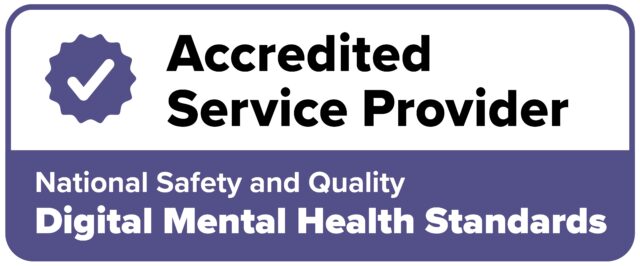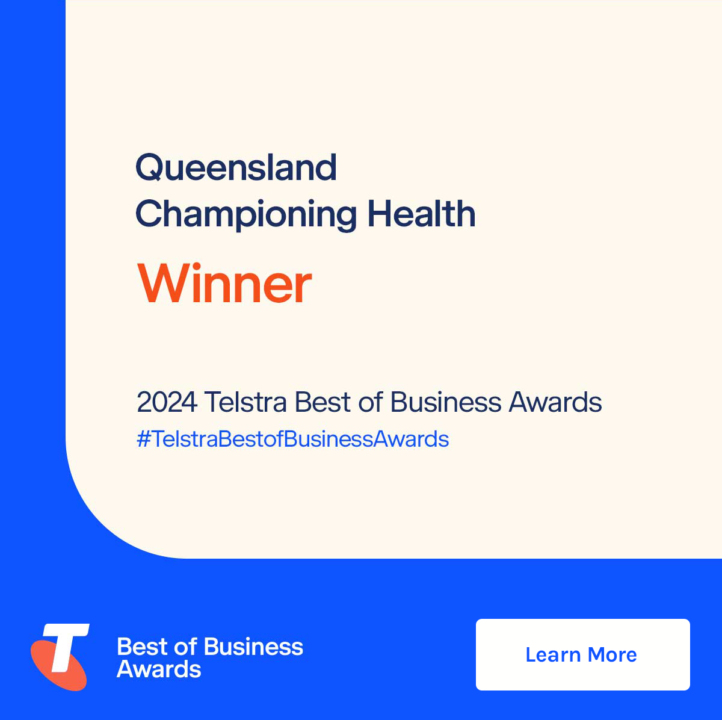
Accredited digital mental health training
DIGITAL MENTAL HEALTH TRAINING
Storytelling is one of the most engaging and effective forms of learning. By sharing the stories told by those with a lived experience, learners build the knowledge, skills and confidence to competently support themselves and others.
Transform your team into Mental Wellbeing Connectors
Empower your team to be more than just aware. Transform them into Mental Wellbeing Connectors.
In today’s fast-paced world, mental wellbeing is not just a priority—it’s essential. Our Mental Wellbeing Connector training empowers your team to spot early signs of distress, build the skills to take action, and connect people to the right support and services.
Delivered through authentic lived experience storytelling, our training is not just informative—it’s engaging, relatable, and deeply impactful.
Accreditation Statement

ConnectedLE have been awarded accreditation to the National Safety and Quality Digital Mental Health (NSQDMH) Standards for three years to May 2027. ConnectedLE were assessed by The Institute for Healthy Communities Australia (IHCA) through rigorous certification process and achieved full compliance against the NSQDMH standards.
What does it mean if a service is accredited to the National Safety and Quality Digital Mental Health Standards?
A government agency called the Australian Commission on Safety and Quality in Health Care wrote the Digital Mental Health Standards to help people identify high quality digital mental health services. They worked with people who use digital mental health, mental health experts and industry to make sure that accredited services pay attention to the things that keep services safe.
An accredited service keeps your information private and they will ask for your feedback They also make sure their services are based on strong evidence.
A service gets accredited by an approved agency that has been trained to check for safety and quality issues. They check evidence to show the service meets the Digital Mental Health Standards so you can know that the service keeps people safe.
The Commission has more information on the Digital Mental Health Standards and what accreditation means.
The ConnectedLE courses listed have been accredited against the NSQDMH Standards and can be found on the Commission’s register of accredited service providers
Competency-Based Training
Competency based education enables each learner the opportunity to move forward at their own pace in building mental health and wellbeing knowledge and skills. It provides flexibility in the learning process, allowing the learner to build inherent skills, no matter their knowledge, background or mental health literacy levels.
ConnectedLE have established set of competencies across the spectrum of mental ill-health and specific needs of the target group. Performance measurement criteria is assessed in two ways:
- ConnectedLE Self-Efficacy Scale issued prior to commencement (pre) and end of course (post), is used to measure changes in confidence level for understanding mental ill-health and applying practical strategies to support help-seeking behaviour.
- Level of attainment of key skills and capabilities is assessed for each training module through 5 pre-quiz and 5 post quiz questions. Training is outcomes-focused, relying more on the learner’s ability to apply knowledge, skills and abilities to the standards of performance in the ConnectedLE ABC Framework for mental health and wellbeing.Participants who complete the accredited ConnectedLE training course are issued with a digital PDF Certificate of Completion.Participants who complete the courses can do a refresher course in 3 years’ time, and continue to up-skill by completing micro-credentialing, depending on interest and professional requirements.
ConnectedLE ABC Framework of Mental Wellbeing
The Framework was developed with a working group of health professionals, lived experience informed advisory group, and representatives from the across healthcare, education, legal and academic sectors. The Framework outlines a set of guiding principles for care governance to ensure the delivery of safe and high-quality mental health education.
The Framework has been established to:
- Adopt authentic lived experience perspectives in co-design and co-creation
- Increase mental health Awareness, Build knowledge and improve Competency levels of Connectors (our learners)
- Promote prevention and early intervention across the continuum of care, including connections to care pathways
- Adopt a strengths-based approach, underpinned by positive psychology in recognition that inherent strengths and social resources can contribute to wellbeing
- Informed by the nationally recognised Stepped Care Model endorsed by Government and in the Fifth National Mental Health and Suicide Prevention Plan
- Informed by the socio-ecological model that is settings-based, enabling training to be tailored to the specific audience the training is targeting
- Psychological safety embedded in training, supporting organisations to meet Safe Work Australia’s new Code of Practice for managing psychosocial risks required under the WH&S Act (and amendments to state legislation).
- Build mental health literacy capability of Connectors to support early help-seeking behaviour, reduce stigma and support inclusive and compassionate care conversations
- Provides analytics and insights to enable reporting of impact and effectiveness of training.
- Ensure professional standards or industry recognised Frameworks are mapped to learning outcomes
ConnectedLE Accredited Training Courses
Mental Wellbeing Co-Responder Course: Essentials training for workforce in proactive prevention and early detection
- Connection and belonging
Neuroscience of connection and belonging, stigma reduction, safe language, cultural diversity and inclusive behaviour, empowering help-seeking, responding to psychological distress, ABC of care conversations. - Anxiety and stress
Impacts of stress, anxiety, generalised anxiety disorder (GAD), panic attack, tips to supporting someone who is overwhelmed - Depression
Types of depression, risk factors and information on other conditions that present like depression, chronic conditions and mental health, support and treatment options - Suicide prevention
Understanding suicide, suicidal thinking and behaviours, safely communicating on suicide, practical tips for understanding suicide, responding to invitations for help, responding to suicidal distress, suicide bereavement and self-care - Psychosocial wellbeing
Science of wellbeing, stress optimisation, psychosocial safety, burn-out, empathy distress, modelling wellbeing behaviours and attitudes, self-compassion, digital wellbeing, mental fitness, sleep hygiene, movement, nourishment, gratitude, empathy, mindfulness
Mental Health Essentials for Healthy Ageing Course: Essentials for frontline workers in aged care, retirement villages and healthcare settings
- Connection and Belonging
Mental wellbeing essentials, elder abuse, age-positive language, stigma reduction, social isolation and loneliness, help-seeking, care conversations - Anxiety and stress
Impacts of stress, anxiety in older Australians, generalised anxiety disorder (GAD), views of Australians 50+, routines for stress reduction - Depression
Types of depression, risk factors, mild cognitive impairment, chronic conditions and depression, support for depression - Psychosocial wellbeing
Science of wellbeing and connection, psychological safety and burn-out, sphere of control, influence and concern, modelling wellbeing, stress optimisation, mental fitness, sleep hygiene, exercise, nourishment, empathy, gratitude, mindfulness
Safeguarding Students Course: Mental health essentials for school educators and support staff
- Connection
Lived experience, mental wellbeing essentials, help-seeking behaviour, stigma reduction, care conversations. - Anxiety and stress
Impacts of stress, anxiety, generalised anxiety disorder (GAD), panic attack. - Depression
Types of depression in young people. Information on other conditions that present like depression. - Suicide prevention
Understanding suicide, suicidal thinking and behaviours, safely communicating on suicide, practical tips for understanding suicide - Substance use
Vaping, binge drinking, illicit drug use - Respectful relationships and consent
Sexual misconduct, ethical bystander, consent, sex positivity, pornography - Identity development and connection
Personal and social identity, relationships, connections, diversity, values, belief systems, ethics - Social media and body image
Social media influence, self-comparison, body image, eating disorders - Embracing imperfection
Perfectionism, fear of failure, emotional regulation, character virtues, resilience, grit, growth mindset - Psychological safety and wellbeing
Wellbeing, stress reduction, reflection, managing burnout, self-care, sleep hygiene, exercise, nourishment, empathy, gratitude, mindfulness, healing
Mental Wellbeing Peer Responder Course: Essentials for student leaders in tertiary colleges and student accomodation
- Connection
Lived experience, peer responder role, mental wellbeing essentials, help-seeking behaviour, stigma reduction, care conversations. - Anxiety and stress
Impacts of stress, anxiety, generalised anxiety disorder (GAD), panic attack. - Depression
Types of depression in young people. Information on other conditions that present like depression. - Suicide prevention
Understanding suicide, suicidal thinking and behaviours, safely communicating on suicide, practical tips for understanding suicide - Substance use
Vaping, binge drinking, illicit drug use - Respectful relationships and consent
Sexual misconduct, ethical bystander, consent, sex positivity, pornography - Identity development and connection
Personal and social identity, relationships, diversity, values, belief systems, ethics - Social media and body image
Social media influence, self-comparison, body image, eating disorders - Embracing imperfection
Perfectionism, fear of failure, emotional regulation, character virtues, resilience, grit, growth mindset - Psychological safety and wellbeing
Wellbeing, stress reduction, reflection, managing burnout, self-care, sleep hygiene, exercise, nourishment, empathy, gratitude, mindfulness, healing
Youth Mental Wellbeing: Essentials for empowering those working with young people
- Connection
Lived experience, peer responder role, mental wellbeing essentials, help-seeking behaviour, stigma reduction, care conversations. - Anxiety and stress
Impacts of stress, anxiety, generalised anxiety disorder (GAD), panic attack. - Depression
Types of depression in young people. Information on other conditions that present like depression. - Suicide prevention
Understanding suicide, suicidal thinking and behaviours, safely communicating on suicide, practical tips for understanding suicide - Substance use
Vaping, binge drinking, illicit drug use - Respectful relationships and consent
Sexual misconduct, ethical bystander, consent, sex positivity, pornography - Identity development and connection
Personal and social identity, relationships, diversity, values, belief systems, ethics - Social media and body image
Social media influence, self-comparison, body image, eating disorders - Embracing imperfection
Perfectionism, fear of failure, emotional regulation, character virtues, resilience, grit, growth mindset - Psychological safety and wellbeing
Wellbeing, stress reduction, reflection, managing burnout, self-care, sleep hygiene, exercise, nourishment, empathy, gratitude, mindfulness, healing
Connected Conversations: Essential communication skills for mental wellbeing
- Connection tips
You have an important role to play as a peer support person. To support others, you must first care for yourself. - Conversation tips
How to connect and ask questions to support others going through a tough time. - Communication tips
Listen with intention and connection by following 5 steps – give your full attention, demonstrate you are listening, validate, don’t problem solve and respond appropriately. - Overcoming communication challenges
There may be times when people may not be ready to accept support – this cannot be rushed or forced. Be aware of stigma and shame.
Self-Care and Wellbeing: Essentials for supporting personal wellbeing
- Science of connection
Neuroscience of connection and belonging. Importance of self-compassion – to support others you must first care for yourself. - Psychosocial wellbeing
Science of wellbeing, stress optimisation, psychosocial safety, burn-out, empathy distress, modelling wellbeing behaviours and attitudes, digital wellbeing, mental fitness, sleep hygiene, movement, nourishment, gratitude, empathy, mindfulness. - Embracing imperfection
Perfectionism, fear of failure, emotional regulation, character virtues, resilience, grit, growth mindset.
Teddy Bear Care Wellbeing Coaching Course: Healthy habits essentials for primary school children
- Germs are Yuck!
Play-based activities around infection control and wellbeing habits - Healthy Bodies
Movement activities that promote wellbeing essentials of exercise - Healthy Minds
Supporting and strengthening mental wellbeing through mindfulness activities like colouring, mindful breathing and play-based activities with Teddy - Healthy Habits
Tips and tricks for supporting overall holistic wellbeing and self-care for wellbeing coaches
Thriving at work: Essentials for psychosocial wellbeing
- Proactive psychosocial wellbeing
Cultivating psychosocial wellbeing through proactive strategies that build capacity and capability for the workforce to thrive. - Enhancing safe work practices
Enhancing safe workplace practices where quality connections create cohesive environments. - Empowering the workforce
Optimising psychosocial wellbeing by empowering the workforce to implement self-care practices leading to workplace satisfaction.
Co-Creating a Brighter Future: Leadership essentials for thriving
- Relatedness and Effective Leadership
Delves into how leaders can create connections and foster a sense of belonging with themselves, and within their teams. Interactive videos and self-discovery content is used to strengthen individual perspectives on their leadership styles. - Building Resilient Teams
This module focuses on team dynamics, strength-based leadership practices, and strategies for facilitating a positive, resilient team culture. - Leading for Thriving
The spotlight is on cultivating a thriving environment in your organisation. This involves learning about innovative approaches to mental wellbeing in the workplace, promoting a growth mindset, and creating an atmosphere where employees can flourish.
Diversity, Equity and Inclusion: Essentials for creating safe and supportive environments
- Understanding Diversity, Equity and Inclusion (DEI)
Define and differentiate between diversity, equity, and inclusion, explore the benefits and challenges of implementing DEI practices, identify common biases and barriers to inclusion - Promoting Safe and Supportive Environments
Personal and social identity, relationships, connections, diversity, values, belief systems and ethics. Techniques for fostering psychological safety, addressing micro-aggressions and discrimination, and supporting diverse teams and individuals
Social Media and Body Image: Essentials to support positive body image, healthy behaviours, and digital boundaries
- Eating Disorders and Social Media
Understand the connection between social media use and eating disorders, learn about different types of eating disorders and their signs, and develop strategies to promote healthy body image and eating behaviours. - Social Media and Body Image
Understand body image and its components, explore the influence of social media on body perception, identify the link between social media use and body dissatisfaction, and equip yourself with tools and digital boundaries to support body positivity.
What you can expect
Build knowledge through engaging and effective real-life stories
Each module is delivered through premium lived experience video content
Users can learn at their own pace, wherever they may be
Content delivery is online and self-paced to facilitate effective learning that is accessible for all users
Gain the practical skills that can be applied to real world situations
Learning outcomes include practical steps that empower users to have care conversations and competently support others
Reconnect with past learnings to support yourself and others competently
24 hour online access provides opportunity for users to re-engage with content to not only reinforce learning outcomes, but to use in situations where practical tips and resources are needed
Learners will also have access to updated evidence-based resources including books, podcasts, blogs and reviews
Personal psychological safety is built into the modules
The learning module package incorporates the resources, links and phone numbers to various helplines and support services which is reinforced at the beginning of each module series in the event the content triggers personal emotional distress
Pre and post assessment of competency levels of users
Enables reporting on the effectiveness of training
Each module is underpinned by the ABC of Mental Health – Awareness Builds Competency which provides a consistent approach to delivery of learning outcomes. Read the Factsheet to learn more.
Empower your organisation
MEMBERSHIP TO CONNECTEDLE COMMUNITY
Promote social and emotional wellbeing in your organisation. Sign up for our online mental health training membership today. Connect and thrive with ConnectedLE.
Price available on request

Mental health workshops
WELLBEING WORKSHOPS
At ConnectedLE, we understand each organisation is unique and will benefit most from a structured workshop that delivers content tailored to your specific needs. In order to achieve this, we will work with you to determine key learning outcomes and ensure your wellness workshop is adapted to suit.
What you can expect
Our face-to-face workshops are presented by our two educators, Kylie and Nicole, who have a collective 40 years of experience in the health sector, including medical education, research and teaching and health promotion.
During the mental health and wellbeing workshop, learners will gain practical strategies through engaging and effective interactive training, including role-playing, real-life scenarios, case studies and simulations that help to reinforce learnings taken from the online eLearning modules. Workshops can be tailored to suit each organisation and vary in duration from full-day, half-day and 1.5 hours.
Although the content delivered is flexible to accommodate for a range of industries, our wellness workshop format stays true to our ABC Framework and lived experience approach. By delivering content through lived experience sharing, we facilitate an engaging and memorable workshop that encourages reflection and thoughtful process which stands to benefit learners now and into the future.
Enabling thriving organisations
Reinforce learnings taken from the online eLearning modules with wellbeing workshops tailored to your organisation. Enquire now to find out more.

















